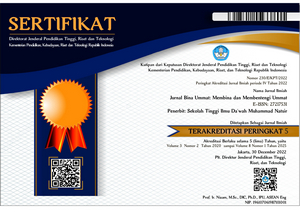MUHAMMAD SEBAGAI PEMIMPIN DA'WAH DAN NEGARA
DOI:
https://doi.org/10.38214/jurnaldawahstidnatsir.v7i1.228Keywords:
dakwah, kepemimpinan, negaraAbstract
Kepemimpinan sekularistik seringkali membedakan porsi keduniaan dan porsi Agama. Konsepsi tentang agama sebagai ajaran yang turun dari langit seringkali dipandang sebagai biang petaka dalam mengatur kehidupan manusia yang plural. Tapi dalam Islam justru kita melihat bahwa Nabi tidak memisahkan kepemipinan dalam agama atau da’wah, dengan kepemimpinan dalam Negara. Keduanya berjalan secara baik dan menjadi keteladanan. Penelitian kualitatif deskriptif analisis berbasis studi kepustakaan ini akan mengkaji dan membuktikan bahwa Nabi bukan hanya pemimpin spiritual dalam da’wah, melainkan pemimpin yang secara integral memimpin urusan negara. Beliau telah mampu membangun tipe kepemimpinan yang sangat ideal namun juga dapat menjadi rujukan dalam konteks kehidupan saat ini.
Published
Versions
- 2024-07-02 (2)
- 2024-06-25 (1)
How to Cite
Issue
Section
Copyright (c) 2024 Jurnal Da'wah: Risalah Merintis, Da'wah Melanjutkan

This work is licensed under a Creative Commons Attribution 4.0 International License.
This work is licensed under a Lisensi Creative Commons Atribusi 4.0 Internasional.
Authors who publish with this journal agree to the following terms:
- Authors retain copyright and grant the journal right of first publication with the work simultaneously licensed under a Creative Commons Attribution License that allows others to share the work with an acknowledgment of the work's authorship and initial publication in this journal.
- Authors are able to enter into separate, additional contractual arrangements for the non-exclusive distribution of the journal's published version of the work (e.g., post it to an institutional repository or publish it in a book), with an acknowledgment of its initial publication in this journal.
- Authors are permitted and encouraged to post their work online (e.g., in institutional repositories or on their website) prior to and during the submission process, as it can lead to productive exchanges, as well as earlier and greater citation of published work (See The Effect of Open Access).




